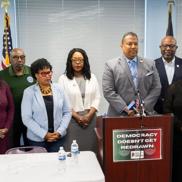-
As the Trump administration turns up the heat on Indiana Republicans to redraw congressional maps in the party’s favor, Democrats issued a warning: Redistricting would dilute the power of Black voters.
“The very structure of the representation, whom gets heard, whom gets counted, is at risk,” state Rep. Earl Harris Jr., D-East Chicago, said during an Oct. 20 press conference at the Julia M. Carson Government Center in Indianapolis.
He was joined by six other members of the Indiana Black Legislative Caucus, who said they would mount a legal challenge if congressional districts are skewed.
The response comes on the heels of a months-long pressure campaign from the White House.
Vice President J.D. Vance made two trips to Indianapolis to meet with lawmakers about redistricting in August and October. And, according to The New York Times, President Donald Trump called Republicans in the Indiana Senate on Oct. 17 to push for a map that would eliminate the state’s two Democratic districts — one in Indianapolis, the other in northwest Indiana.
Redistricting usually happens every decade after new Census data is collected. But Trump has pushed several states to draw new maps now — ones that would help Republicans maintain control of the U.S. House of Representatives in the 2026 midterm elections.
Members of the Black caucus acknowledged the decision to redistrict Indiana ultimately rests with their Republican colleagues, who have a supermajority.
But they also promised to fight for voters living in Indianapolis, Gary and Fort Wayne — the three cities with the largest Black populations in the state.
“We need to make sure our congressional representation is proportional to the vote that comes out on election night,” said state Rep. Cherrish Pryor, a Democrat from Indianapolis.
Republican Gov. Mike Braun has not yet called a special session on redistricting, which would bring lawmakers back to vote on the issue outside of the normal legislative calendar. In September, Braun said redistricting will “probably happen” and warned Indiana could face “consequences” for not working with the Trump administration.
During the press conference, Harris shared a counterpoint: “If there is a special session, it must be for the people of Indiana,” he said. “Not for someone in Washington, D.C.”
‘They need to listen to us’
The Democratic legislators encouraged people who oppose redistricting to call their state representatives — especially Republicans, who are not completely unified on the issue. The group named two high-ranking leaders who hold sway over the party: Indiana President Pro-Tempore Rodric Bray and House Speaker Todd Huston.
Recent polls show the majority of Hoosiers oppose redistricting.
State Rep. Vanessa Summers, a Democrat from Indianapolis, isn’t sure those voices will be heard. In that case, she said, the caucus would shift gears to educating voters about the changes.
“I don’t know enough of the (Republicans) to know if they would stand on principle,” Summers told Mirror Indy after the press conference. “And if we end up with different representatives, then they need to know who we are and that they need to listen to us.”
The Indiana Black Legislative Caucus is also closely watching the U.S. Supreme Court, which is hearing a case that could weaken the Voting Rights Act of 1965, which prohibits racial discrimination in voting practices, including redistricting maps.
Indianapolis state Sen. Greg Taylor said a potential lawsuit over Indiana’s new maps would be impacted by the decision.
“We’ll absolutely see a challenge,” he said. “The difficulty right now is predicting the success of that legal challenge.”
This article was published by TheStatehouseFile.com through a partnership with Free Press Indiana, a nonprofit organization with a mission to fill information gaps in the state.




